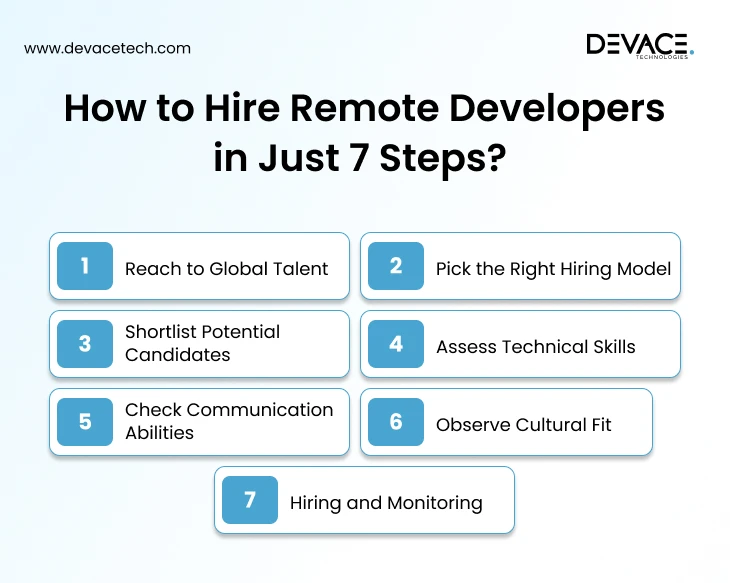Companies are focusing on hiring remote developers to access global talent, accelerate project timelines, and reduce costs. Whether you are an established enterprise planning to scale your software infrastructure or a new tech startup, you can hire remote developers offering efficiency and flexibility. This blog tells in detail why and how to hire remote developers, what key advantages you can have, what the cost would be, and how beneficial it is to partner with a reliable team.
Why You Should Hire Remote Developers
Rapid globalization and digital transformation have made it a practical and strategic move for firms to hire remote developers because they do not want to be stuck with local talent. This way, companies can hire remote programmers who bring in flexible working arrangements, specialized skills, and a fresh perspective.
Moreover, with remote hiring, it becomes possible to access different cultural insights that help in creating more user-friendly and inclusive products. It also assists in building resilience against local or regional disruptions like natural disasters, political unrest, or economic shifts.
Key Advantages of Hiring Remote Developers
Some important benefits of hiring remote developers include access to talent worldwide, cost efficiency, enhanced productivity, flexibility, and faster time to market. See details:

1. Reach out to Global Talent
You can tap into a global talent pool when you hire a remote development team. It allows you to go beyond the skills available in your immediate region. You can target and hire talent from countries that are popular for tech specialists and developers, including Poland, the USA, the Philippines, and Ukraine. Moreover, this wide reach is useful in finding experts with specific technical skills that are hard to find in the local digital market.
Different countries have their own strengths, like Latin America has bilingual developers, and Ukraine is popular for enterprise software. So, you can leverage all these capabilities and skills by hiring remote web developers.
2. Cost Effectiveness
Another benefit of taking remote developers on board is cost effectiveness. By remote hiring, you cut down on office costs such as hardware, utilities, rent, and other miscellaneous expenses. Moreover, you can also leverage regional pay differences. You may also save up on insurance, onboarding costs, and other benefits as well.
With remote hiring, many organizations report saving around 40-70% of total web development costs.
3. Enhanced Productivity
Higher productivity levels are demonstrated by remote web developers. A better focus on work and reduced burnout is ensured by working on flexible schedules and in a comfortable environment. It is usually observed that remote workers give more hours to work in comparison with their on-site counterparts.
Moreover, productivity is on a higher scale due to less commute stress, improved mental health, and fewer distractions. With tools like agile boards, daily stand-ups, and time trackers, performance is enhanced.
4. Flexibility and Scalability
Scalability is offered by remote developers to scale up or down your web projects depending on requirements. If you need skilled hands for a particular task within a project, you can hire remote engineers for a short time duration and get that assignment done. Do you want to work on a small project? Hire a remote developer for that. In a dynamic environment, this flexibility is invaluable.
You can scale up your development team within a few days with the help of partners like Devace Technologies, having access to skilled and expert developers.
5. Faster Launch
When you work with web developers in different time zones, your project’s progress continues. Moreover, when your local team is not active online, you can work with a remote team. This way, you can ensure continuous development that can minimize time to market. It gives your website and other products a competitive advantage.
Moreover, a remote team that is well-coordinated can achieve more success in less time, avoid glitches, and make sure that all updates and features reach users in the minimum time.
Challenges to Hiring Remote Developers
Although remote developers bring a lot of benefits to web projects, you may face certain challenges when you hire remote software developers. See details of challenges involved and how you can tackle them effectively:
1. Communication Issues
Taking remote developers on board from different countries or regions may cause language barriers. This leads to cultural differences as well, causing difficulty in communication and operational delays if not handled properly.
Solution:
To fix this issue, you can prioritize transparency, clarify communication tools, and utilize visual project tracking tools. It helps everyone involved in a particular project to stay on the same page. Moreover, you can hire dedicated developers who are proficient in multiple languages.
2. Difficulty in Time Zone Management
Another challenge while hiring remote development teams is managing time differences and time zones. Although being in different time zones helps in the continuous progress of the project, it may affect real-time collaboration.
Solution:
It is possible to tackle this challenge by using certain tools such as World Time Buddy, asynchronous communication practices like Slack updates or Loom videos, and shared calendars.
3. Ineffective team integrations
Sometimes it feels a bit tricky to integrate remote developers into an already existing team. If not properly engaged, they might feel disconnected or isolated. That’s why it is crucial to make them a part of decision-making processes, virtual activities, and regular team meetings.
Solution:
You can deal with this thing by celebrating small achievements, encouraging inclusive participation, and setting up virtual team-building exercises.
4. Security Concerns
In remote work, the risk of data leaks and breaches increases when you are dealing with sensitive data specifically.
Solution:
Such security threats can be minimized by adopting secure networks and safe protocols. Moreover, you can implement multi-factor authentication, encrypted communication channels, and audit access control immediately to protect sensitive data and IP.
5. Disturbance in Performance Monitoring
Lacking suitable tools may cause disruptions in performance monitoring. Sometimes it also becomes difficult to maintain transparency and accountability.
Solution:
You can leverage certain tools like Trello, Monday.com, or Jira to handle project management, and Clockify or Harvest for tracking time. Consistency and quality can be ensured by regular sprint retrospectives and code reviews.
How can you avoid challenges while hiring remote web developers?
How to Hire Remote Developers in Just 7 Steps?
To hire a dedicated remote development team, you can follow these 7 steps, avoiding possible issues during the whole process:

1. Define Project Requirements
Always start by defining your project requirements. Also, determine whether you require backend, frontend, full stack developers, or DevOps or mobile engineers. Then, enlist all the technologies and tools they should be experts in and set your development time frame and budget. Also, include soft skills such as adaptability and teamwork and hard skills like scripting languages.
It is also important to clarify beforehand whether you want developers for a long-term project or a short-term web development task.
2. Pick the Right Hiring Model
Once you have defined your project requirements, decide on a hiring model based on these requirements. You can hire full-time remote developers for long-term projects or freelancers for projects that can be completed in a short time duration. Another model can be partnering with a reputable software development company.
Another option could be the hybrid approach, combining remote and in-house teams for flexibility.
3. Shortlist Potential Candidates
After opting for the suitable hiring model, shortlist candidates. Potential candidates can be searched on websites like LinkedIn, Stack Overflow, and GitHub, or other job portals like Clutch, Toptal, and Upwork. Moreover, different web development agencies offer access to remote talent.
For shortlisting candidates, look for previous client testimonials, code samples, signs of long-term reliability, and relevant experience. This way, you can stay objective by designing a structured shortlisting process.
4. Assess Technical Skills
To evaluate candidates’ technical skills, you can conduct different assessments to check coding abilities, understanding of software architecture, and problem-solving skills. Moreover, different platforms like Codility or HackerRank are recommended for conducting such assessments.
Technical interviews can also be conducted to assess knowledge and expertise. It can be a good idea to involve a technical lead or a senior developer in the hiring process.
5. Check Communication Abilities
Remote work highly depends on effective communication. That’s why developers must have great communication skills. Having good communication skills means developers can respond promptly, collaborate across teams, and clearly express ideas. You should search for strong verbal and written communication abilities while recruiting developers.
Moreover, effective communication abilities can be assessed by simulating real-world scenarios like discussions on feature requirements.
6. Observe Cultural Fit
Any remote developer who is culturally fit for your company’s environment or project can work and assimilate easily with your work ethic, playing a part in the project’s successful development. To check their cultural fit while hiring, you can ask about their preference, ability to adapt to a remote work environment, and experience collaborating with teams.
7. Hiring and Monitoring
Once you have completed the whole evaluation process, take remote developers on board by sharing documents and essential data. Also, introduce them to the workflows and tools that you use. Smooth collaboration is established by performance reviews and regular feedback.
What Essential Skills a Remote Developer Should Possess
Remote web developers must have these skills, which will help them in getting hired:
- Technical Knowledge: Strong knowledge of programming languages and other technical frameworks, relevant tools, and APIs.
- Communication Skills: Good communication abilities ensure tasks are communicated and understood effectively.
- Problem-Solving Capabilities: Analytical abilities to think critically and resolve bugs or other technical issues.
- Time Management: Remote developers should manage their working schedules effectively and meet deadlines.
- Proficiency with Remote Tools: Proficiency with project management tools such as Asana, Jira, Trello, Zoom, or Slack is a must.
- Discipline and Self-Motivation: Discipline is crucial for remote developers to work independently without continuous guidance.
- Cross-Cultural Capacity: Awareness of cultural differences helps in reducing friction and improving collaboration among remote and in-house teams.
What is the Cost of Hiring a Remote Development Team?
The cost of hiring remote developers or a team depends on various factors, including their location, level of expertise, experience, nature of the project, and complexity. Let’s have a look at the given table to see the estimated costs in different regions:
| Region | Hourly Rate (in Dollars) |
|---|---|
| Eastern Europe | 30-70 |
| North America | 60-150 |
| Latin America | 25-60 |
| South Asia | 20-50 |
Partnering with Devace Technologies
If you partner with Devace Technologies to hire remote developers, we can facilitate this by offering highly skilled and thoroughly vetted experts. Whether you want a full development squad or a single developer, Devace Technologies fulfills your requirements.
Wrapping Up
It is no longer just a choice to hire remote developers; in fact, it’s a forward-thinking approach to design strong, innovative, and cost-efficient tech teams. They assist in gaining a competitive edge by speeding up the development process, minimizing costs, and accessing global talent. With the right development tools and partner, you can tackle challenges associated with hiring, ensuring the successful completion of web projects.
Are you looking for a reliable remote development team?
Frequently Asked Questions
How time zone difference influence remote teams?
Time zone differences influence remote development teams. Positively, teams are enabled to work around the clock, ensuring faster development. However, a drawback is that sometimes it becomes difficult to communicate among teams working in different time zones.
Can I change the developer in mid-project?
Yes, you can change the developer during a project in case their services are not required anymore, or if you hired them to complete a specific part of your project.
What is the best way to evaluate technical skills?
Technical skills can be evaluated by combining coding assessments, live scenarios, and technical interviews. You can also get useful insights by reviewing GitHub activity and portfolios.
Is it safe to hire remote developers?
Yes, hiring remote developers is secure if you can manage them well. To ensure further security, you can consult a development firm and utilize secure tools.
What legal documents do I need to hire remote developers?
While hiring remote developers, you can make legal contracts in compliance with local law, covering IP rights, payments, and scope.
Should I choose full-time remote developers or freelancers?
It solely depends on the nature and time duration of projects. A short-term project would be suitable for freelancers. On the other hand, taking full-time remote developers on board would be more feasible for long-term web projects.






